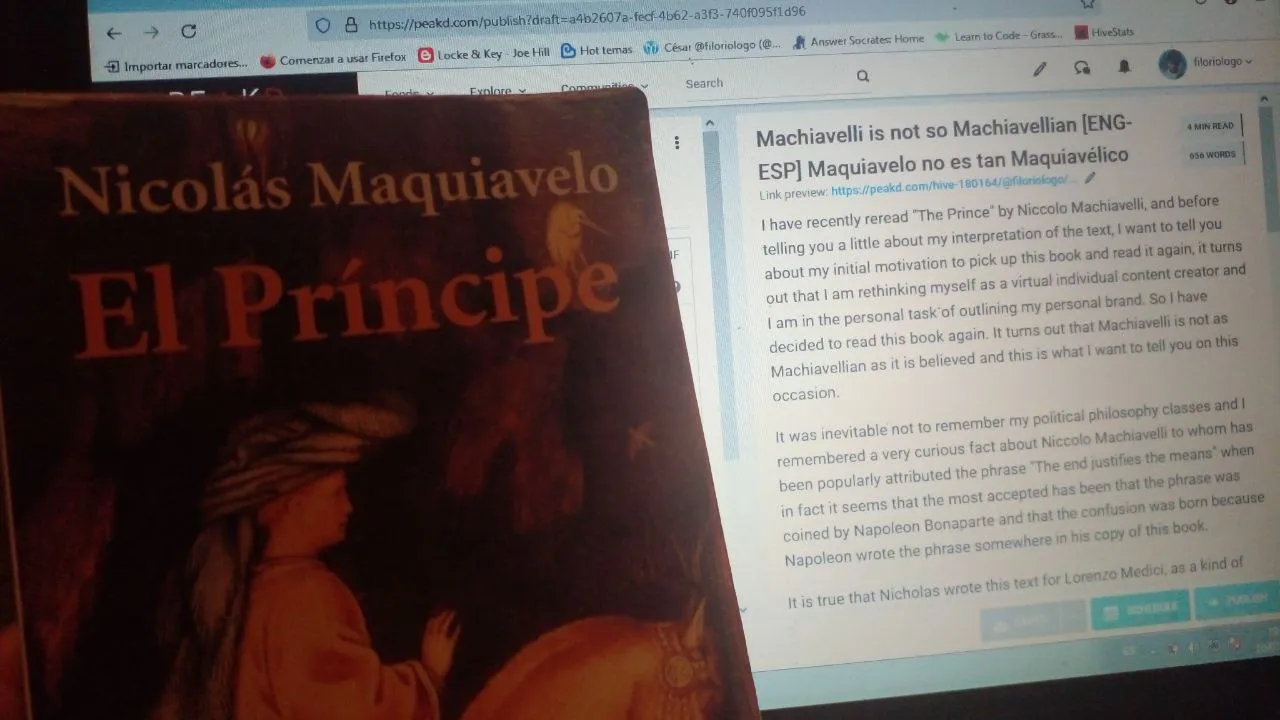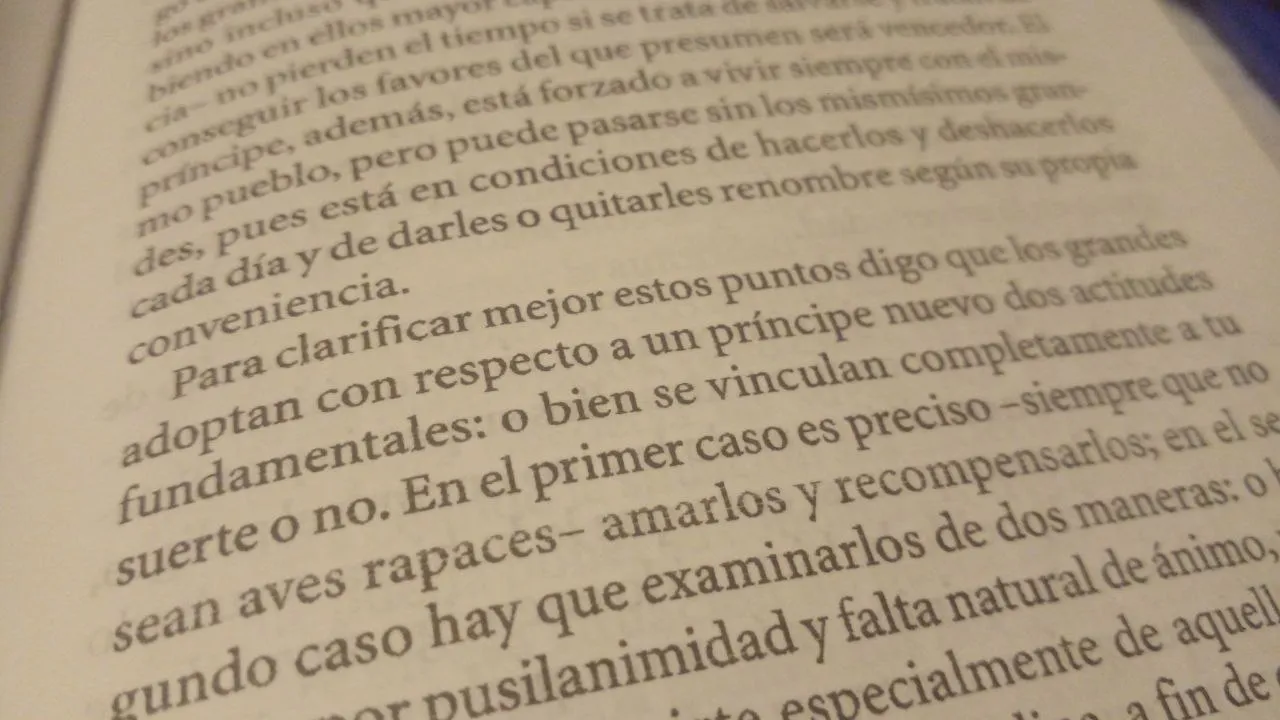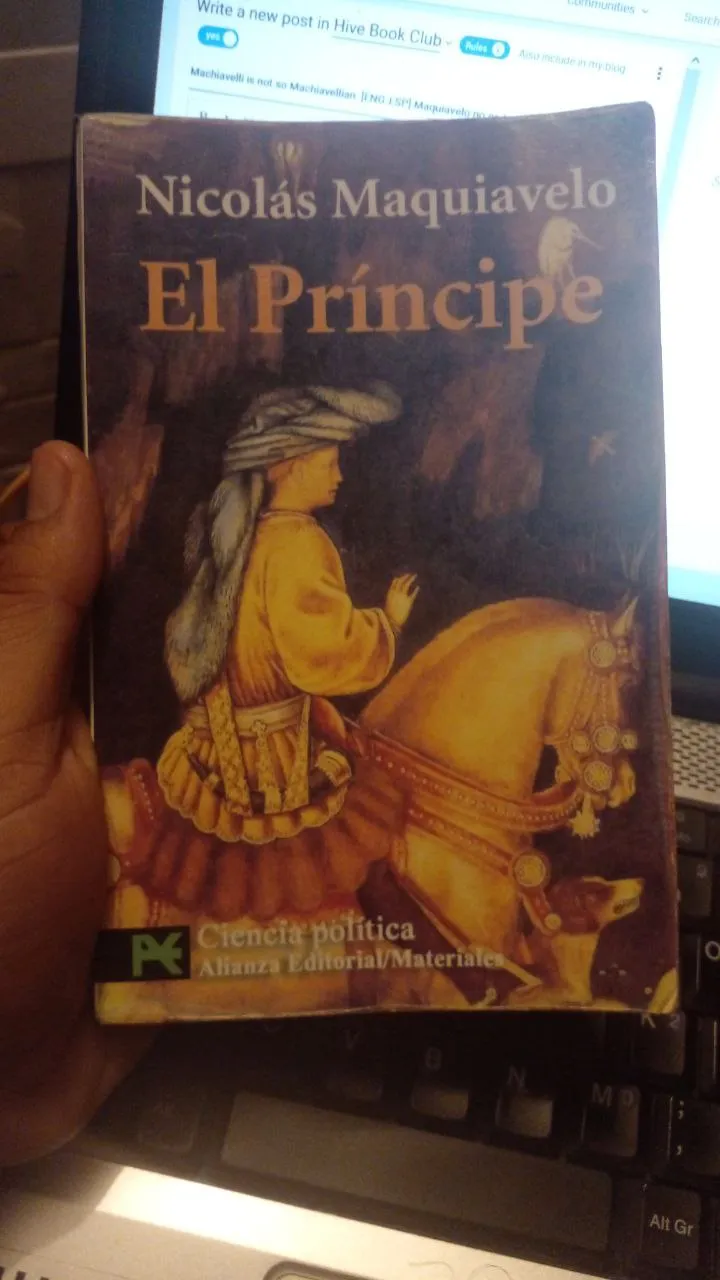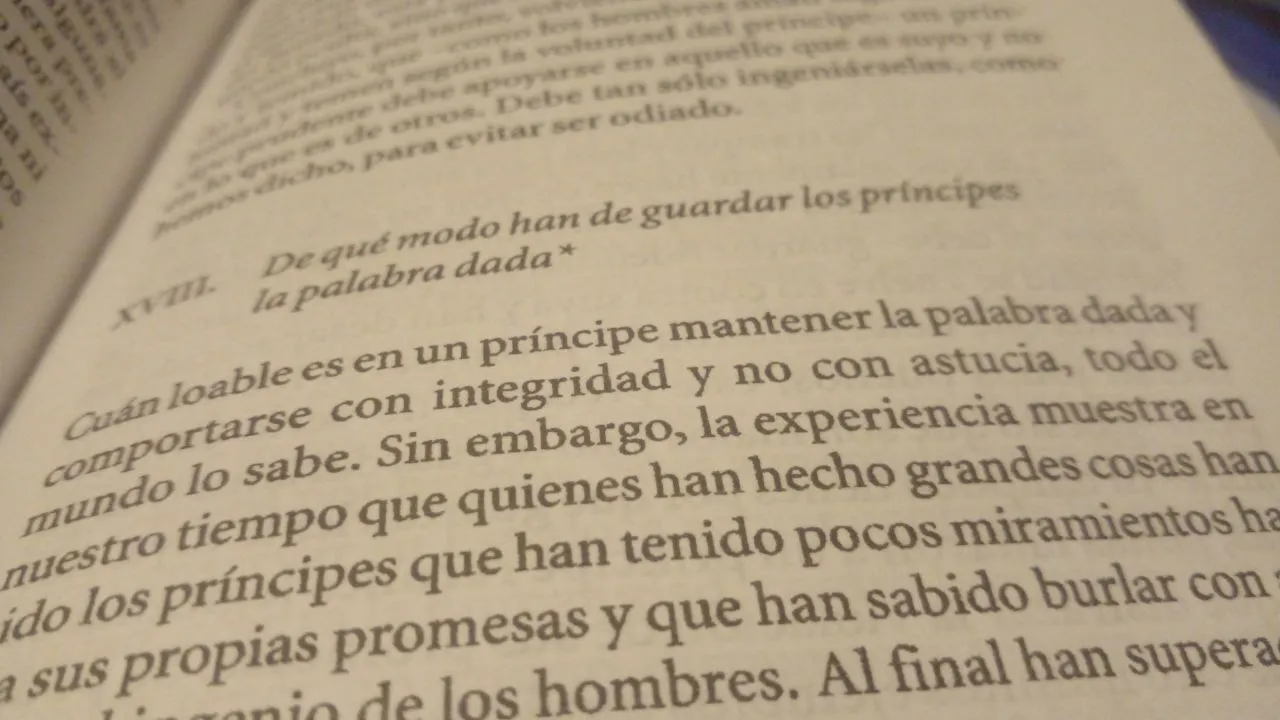
Photo by @filoriologo
I have recently reread "The Prince" by Niccolo Machiavelli, and before telling you a little about my interpretation of the text, I want to tell you about my initial motivation to pick up this book and read it again, it turns out that I am rethinking myself as a virtual individual content creator and I am in the personal task of outlining my personal brand. So I have decided to read this book again. It turns out that Machiavelli is not as Machiavellian as it is believed and this is what I want to tell you on this occasion.
It was inevitable not to remember my political philosophy classes and I remembered a very curious fact about Niccolo Machiavelli to whom has been popularly attributed the phrase "The end justifies the means" when in fact it seems that the most accepted has been that the phrase was coined by Napoleon Bonaparte and that the confusion was born because Napoleon wrote the phrase somewhere in his copy of this book.
It is true that Nicholas wrote this text for Lorenzo Medici, as a kind of apology since he was imprisoned by this family after suspecting him of a conspiracy against the Medici house, and it was published posthumously, the truth is that this little work is a real gem, it changed the way of thinking politics and not because it contains the formula of the tyrant.

Photo by @filoriologo
I believe that it has had a very negative marketing, and it seems to me that it was born by foolish readers who did not understand the true message of Nicolás, causing an aura of certain fear and chills to be built around the book. But, I consider that it should be a text that everyone should read not once, but several times in life.
Machiavelli was not Machiavellian at all, it turns out that this text outlines the vicissitudes that a political leader will go through, when you read carefully enough you will notice the broad historical knowledge that the Florentine author possessed, it is also more than evident that his political vision was unique, not for nothing was he dedicated to diplomacy. As a curious fact and making a small parenthesis in my attempt to remove some bad karma around Niccolo Machiavelli and his text "The Prince", it must be said that, Niccolo was a friend of the great Leonardo Da Vinci and together with him, he worked for a time for Cesare Borgia.
Now, if you have not read this text, you should do so because after reading it you will understand what we people face when we undertake a great enterprise, a great project involves making decisions, to understand in a pragmatic way the human condition in political matters and in this text, no doubt, you will learn to see from Machiavelli's eyes how we human beings act in certain circumstances, and how we can proceed in the face of certain challenges that require us to make big decisions. We cannot remain with a simplistic interpretation that politics and power is about exercising force as a tyrant.
Each section of the text has its richness, it is not about being cruel because goodness is weakness, nor thinking that the stronger oppress the weaker, but to understand the contexts in which we find ourselves, and understand how we can act. Machiavelli did not write a manual for Lorenzo Medici, he wrote a deep political-historical analysis, which today continues to contribute with extreme precision. I honestly enjoyed a lot this reading, maybe in some time I will read him again.
You have to look beyond the everlasting cliché phrases such as believing that it is better to be feared than loved, in reality it is about being respected, and **Machiavelli **understood this well, not for nothing is he still considered the father of modern political thought, what Da Vinci is to painting, Machiavelli to Politics.
Thank you for reading.

VERSIÓN EN ESPAÑOL
Maquiavelo no es tan Maquiavélico

Photo by @filoriologo
Recientemente he vuelto a leer “El Príncipe” de Nicolás Maquiavelo, y antes de comentarles un poco de mi interpretación del texto, quiero hablarles de mi motivación inicial para volver a tomar este libro y leerlo de nuevo, resulta que me ando repensando como individuo virtual creador de contenido y ando en la tarea personal de esbozar mi marca personal. Por ello he decidido leer de nuevo este libro. Resulta que Maquiavelo no es tan maquiavélico como se cree y es esto lo que quiero comentarte en esta ocasión.
Fue inevitable no recordar mis clases de filosofía polìtica y me recordé de un dato muy curioso sobre Nicolás Maquiavelo a quien se le ha atribuido de manera popular la frase “El fin justifica los medios” cuando en realidad al parecer lo más aceptado ha sido, que la frase fue acuñada por Napoleón Bonaparte y que la confusión nació debido a que Napoleón escribió la frase en algún lugar de su ejemplar de este libro.
Cierto es que Nicolás escribió este texto para Lorenzo Medici, como una especie de disculpa ya que fue encarcelado por esta familia tras sospechar de su parte una conspiración en contra de la casa Medici, y fue publicado de manera póstuma, lo cierto es que esta pequeña obra es una verdadera joya, cambió el modo de pensar la política y no porque en ella esté la fórmula del tirano.
Creo que ha tenido un marketing muy negativo, y me parece que nació por parte de los lectores insensatos y que no comprendieron el verdadero mensaje de Nicolás, haciendo que se haya edificado un aura de cierto temor y escalofríos alrededor del libro. Pero, considero que debe ser un texto que todos debemos leer no una vez, sino varias veces en la vida.

Photo by @filoriologo
Maquiavelo no era para nada maquiavélico, resulta que este texto esboza las vicisitudes que atravesará un líder político, cuando lees con la atención suficiente notarás el amplió conocimiento histórico que poseía el autor florentino, también es más que evidente que sus visión política era única, no por nada se dedicó a la diplomacia. Como dato curioso y haciendo un pequeño paréntesis en mi intento de quitar un poco de mal karma al rededor de Nicolas Maquiavelo y a su texto “El Príncipe”, hay que decir que, **Nicolás **era amigo de el gran Leonardo Da Vinci y junto a él, trabajó un tiempo para César Borgia.
Ahora bien, si no has leído este texto, deberás hacerlo ya que tras su lectura entenderás, a qué nos enfrentamos las personas cuando emprendemos una gran empresa, un gran proyecto implica tomar decisiones, poder entender de manera pragmática la condición humana en asuntos políticos y en este texto, sin duda, aprenderás a ver desde los ojos de Maquiavelo como actuamos los seres humanos en ciertas circunstancias, y cómo podemos proceder frente a ciertos retos que nos exigen la toma de grandes decisiones. No podemos quedarnos con una interpretación simplista de que la política y el poder se trata de ejercer la fuerza como un tirano.
Cada apartado del texto, tiene su riqueza, no se trata de ser cruel porque la bondad es debilidad, ni pensar que el más fuerte oprima al más débil, sino de entender los contextos en los cuales nos encontramos, y entender cómo podemos actuar. Maquiavelo no escribió un manual para Lorenzo Medici, escribió un profundo análisis político-histórico, que hoy en día sigue aportando con extrema puntería. Honestamente he disfrutado un montón esta lectura, quizá en algún tiempo le vuelva a leer.
Hay que mirar más allá de las sempiternas frases clichés como el creer que es mejor ser temido que amado, en realidad se trata de ser respetado, y Maquiavelo lo entiende bien, no por nada aun se sigue considerando el padre del pensamiento político moderno, lo que Da Vinci es a la pintura, Maquiavelo a la Política.
Gracias por leer

.